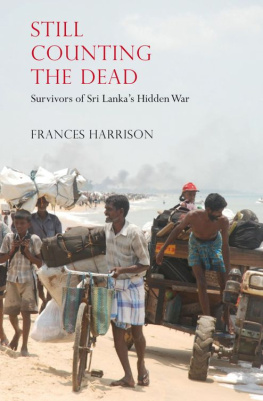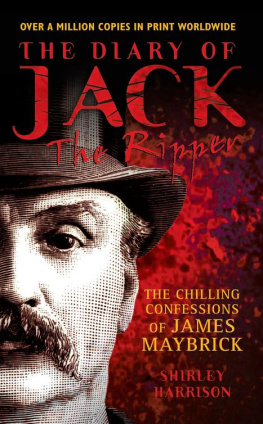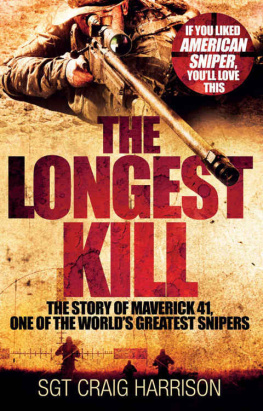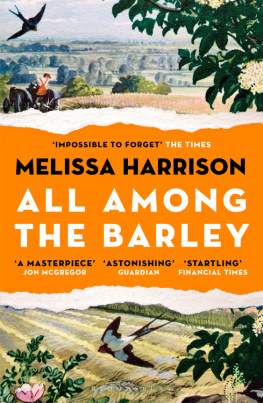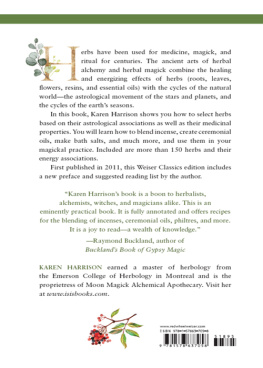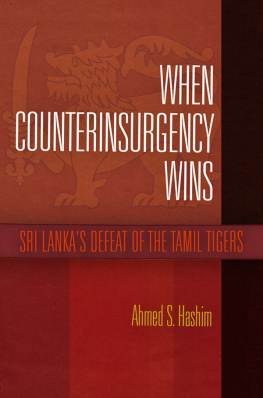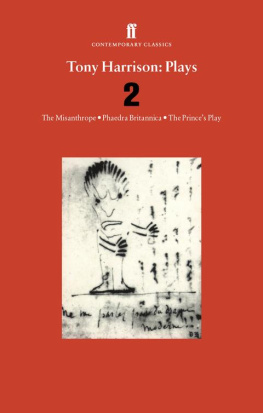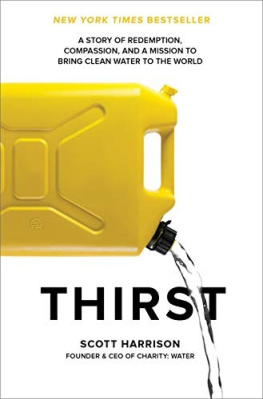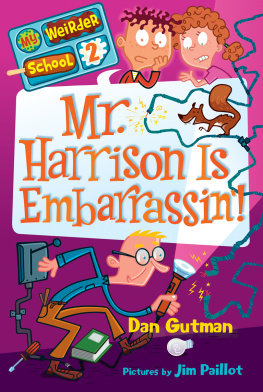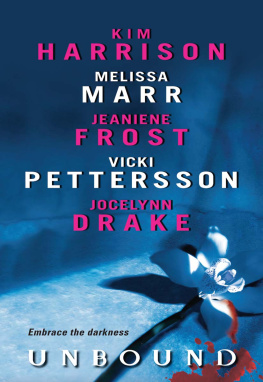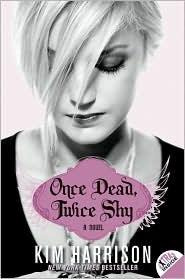Copyright 2012 Frances Harrison
First published in Great Britain in 2012 by Portobello Books
All rights reserved. No part of this publication may be reproduced or transmitted in any form or by any means, electronic or mechanical, including photocopying, recording, or any information storage and retrieval system, without permission in writing from the publisher.
Distribution of this electronic edition via the Internet or any other means without the permission of the publisher is illegal. Please do not participate in electronic piracy of copyrighted material; purchase only authorized electronic editions. We appreciate your support of the authors rights.
This edition published in 2012 by
House of Anansi Press Inc.
110 Spadina Avenue, Suite 801
Toronto, ON, M5V 2K4
Tel. 416-363-4343
Fax 416-363-1017
www.houseofanansi.com
Poem from Ullmai by Elil Rajan (2006), Sri Lanka: Society of Jesus, reproduced by kind permission of the author.
LIBRARY AND ARCHIVES CANADA CATALOGUING IN PUBLICATION
Harrison, Frances
Still counting the dead [electronic resource] : stories from Sri Lanka's killing fields / Frances Harrison.
Includes bibliographical references and index.
eISBN 978-1-77089-305-4
1. Sri Lanka History Civil War, 1983-2009. 2. Sri Lanka History Civil War, 1983-2009 Atrocities. 3. Sri Lanka Histort Civil War, 1983-2009 Casualties. I. Title.
DS489.84.H37 2012 954.9303'2 C2012-904131-9
Cover photograph: Frances Harrison

We acknowledge for their financial support of our publishing program the Canada Council for the Arts, the Ontario Arts Council, and the Government of Canada through the Canada Book Fund.
Burning
Those lives go uncounted, Unaccounted.
Yet a day will come
Where history will speak
That which no celluloid spoke
Bones
Broken
Disfigured
Deranged
Morphed
Alienated
Ripped
Destroyed
Denied
Lost
Laboured
Buried
Silenced
Snuffed
The scorched earth knows it all.
Elil Rajan, Ullmai, Sri Lanka:
Society of Jesus, 2006
Contents
First and foremost, I would like to pay homage to the Sri Lankan Tamils who shared their stories with me. It was a huge leap of faith. Survivors trusted me when at their most vulnerable. Many of their names have been changed in order to safeguard family members still inside Sri Lanka.
I apologise that not all the stories I recorded are included in this book, on grounds of space. There were people who spent hours recounting horrific experiences, helping me understand better what it was like to be inside the war zone. They were invaluable and I hope they do not feel their efforts went to waste. Many cannot be named, but among them are: Dhamilvany Kumar, Mrs Javan, Jegan, Uthayan, Meena and Murugan. There was also the skeletal lady who physically shook in her chair as she told me how her sixteen-year-old nephew had been forcibly recruited by the Tigers, only to disappear without trace; I am sorry I put her through the trauma of reliving those experiences.
This book wouldnt have come into existence if Sri Lankan friends both Sinhalese and Tamil had not kept in touch after I left the country. Many journalists I knew from press conferences in Colombo were forced into exile in 2009, and from their experiences I grasped how much the paradise island had changed. If Pulidevan hadnt telephoned throughout the war, compelling me to take notice of what was unfolding, I am not sure I would have even thought of writing about Sri Lanka.
A great deal of people aided me in tracking down survivors. Many cannot be named, for their own security. Among colleagues, Bashana Abeywardene of Journalists for Democracy has been the most long-suffering , and Chandana Bandara of the BBC Sinhala Service kindly read a draft to check for cultural and political faux pas. Nirmanusan Balasandaram was generous with contacts and information; Annuuddha Lokkuhapuarachchi, former chief photographer for Reuters in Colombo , looked for photographs for me; and Karunakharan Pathmanathan, former BBC Tamil Service reporter in Colombo, translated videos.
Special thanks go to SJ, who read some chapters and guided me in other ways. His courage is evident in his intention to return to Sri Lanka to serve his people. Many members of the Catholic Church who must remain anonymous have won my enormous respect for their commitment to human rights and truth at considerable personal cost. Sadly they are not the rising figures within the clerical establishment in Sri Lanka, but they should be.
Several people translated for me in different countries; many found it deeply upsetting. I owe them all a huge debt, especially S. Akka and her very hospitable cousin, who has supported many Tamils in trouble. Thanks also to Dr Panchakulasingam Kandiah and the budding author Malavi.
Mr S drew the map when he had far more important and life-threatening things on his mind; I sincerely hope that one day he finds his family. J and his wife in Australia showed me the wider historical perspective of the Sinhalese uprisings in the south of Sri Lanka. Special thanks also to Mr and Mrs Fernando who personally sacrificed an enormous amount to speak out for justice for Tamils. In Australia, many dedicated people helped me go inside Villawood Detention Centre to interview asylum seekers and translate. Around the world it has been inspiring to see how many individual Tamils have taken it upon themselves to support total strangers who survived the war. Along the way kind people have fed me delicious spicy meals and waited patiently for me to finish my interviews. Thank you also to the nun who looked after me with such poise when I was visibly upset after interviewing Sister Ignatius.
Many non-Sri Lankans have helped in the production of this book, including several United Nations staff around the world who were very uncomfortable about what happened. Dixie, who has become a friend, generously read an early draft of the book and is now incorporating some of my material into his forthcoming graphic novel on the history of the Sri Lankan ethnic conflict. Vidar Helgesen, secretary-general of International IDEA, was very supportive and introduced me to his friend L, whose ambition from the start was to see Hollywood make a movie about Sri Lanka. Thanks also to former Norwegian Minister of International Development Erik Solheim, a rare politician who cares deeply about a tiny island on the other side of the world that wont win him any votes. I am also indebted to several Norwegian officials who spoke to me off the record. Nordic Norway couldnt be more different from tropical Sri Lanka, but it has shown a commendable altruism in trying to mediate peace there. Beate Arnestad, whose latest film Silenced Voices tracks the impact of the last phase of the war on three exiled Sri Lankan journalists, was incredibly generous with contacts and has become a fellow-traveller. Marie Colvin, tragically killed this year in Syria reporting on very similar shell attacks on civilians in Homs, was staunchly supportive of this venture. She came close to losing her life while trying to tell the Sri Lankan story; and when I first met the Tigers they quite legitimately asked me why I wasnt a proper war correspondent like Marie Colvin!
I should also thank Alan Keenan of the International Crisis Group; colleagues at Amnesty Internationals News Unit; Sam Zarifi, Steve Crawshaw and Yolanda Foster; Ole Solevang of Human Rights Watch; Edward Mortimer, Raj Thamotheram and Professor Craig Scott of the Sri Lanka Campaign; Jo Glanville of Index on Censorship; Peter Bowling of International Working Group; and Jacobo Quintanilla of Internews. I am also grateful to Gordon Weiss, author of

